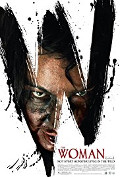
Directed by
Lucky McKee
108 minutes
Rated R
Reviewed by
Bernard Hemingway

The Woman
Synopsis: While out on a hunting trip, family man and smalltown lawyer Chris Cleek (Sean Bridgers) comes across a strange wild woman (Pollyanna McIntosh) bathing in a creek. He captures her and chains her up in his basement. Treating her as his personal experiment he involves his entire family in what he calls a process of civilization but as this involves chaining her up and subjecting her to various forms of physical abuse.Lucky McKee’s film comes with a good deal of advance publicity thanks to the Youtube video of an outraged dude at its Sundance screening decrying it for degrading women and recommending that all prints should be destroyed forthwith. With not unusual irony this has given the film a “must see” buzz, not only in that strangely mutant underworld occupied by horror fans, who already hold the director in high esteem for his 2002 cult hit, May, but also amongst the broader populace of above-ground indie film lovers. Controversy sells.
Let me say firstly that I don’t watch horror – not Christopher Lee/Vincent Price old school shlock, not Wes Craven or Tobey Hooper gore fests, and not the latest generation of “torture porn” films like the Saw franchise or The Human Centipede. I understand that there is a sad and sorry portion of population who regards this sort of stuff as entertainment but my motive in seeing The Woman was purely sociological - to learn what counts as controversial in our emotionally desensitized world. And, whilst acknowledging my own desensitization, I’d have to say that that Sundance dude is probably crying in the wilderness on this one.
The Woman does have a sexploitational component but frame for frame probably no more than your average James Bond movie and whatever misogyny there is discernible is no more than you’ll find in many a Hitchcock film (the shower scene from Psycho anyone?). And I’m not even comparing it to the whole raft of splatter fests that are out there, simply because I’ve never seen one but which, I imagine, make McKee’s film look like a Disney production. In fact, leaving its content aside for the moment, The Woman is a well-crafted, relatively conventional example of, broadly speaking, the psycho thriller – a nut job is on the loose, is holding someone or ones hostage and the film-makers have 100 or so minutes to turn the tables. I expect a lot of (well and truly desensitized) people will take this film as such and regard it a “fun” film.
However there is something more to McKee’s film that makes it of interest. It was co-written by Jack Ketchum who, to quote IMDB, writes “fiction that deals with the cruelty and violence so often apparent in everyday life”. This to me seems to be the real agenda at work in The Woman. For despite the film’s title it is about the nuclear family and in particular the traditional model of it as ruled by the dominant male. The title, if anything, refers not to the feral creature in captivity, which is female but, as we eventually find out, no lady, but to Belle (Angela Bettis) Cleek’s meekly obedient wife as representative of her sex under patriarchal rule. The family shown here is in principle very much like the one depicted with such accuracy in Terrence Malick’s recent The Tree Of Life, only couched in the metaphoric terms of the horror film rather than the realistic detail of the period drama. And it isshown with a good deal of bitterness and no redemptive bitter-sweetness at all. In this respect the feral creature in the basement is your classic Devil Inside – in particular, the manifestation of Cleek’s own psychosis and, in general. a representation of the irrationally destructive forces that seethe beneath the facade of social propriety, whatever form that takes (Michael Winterbottom’s The Killer Inside Me, 2010, dealt with similar ideas in the form of a retro crime yarn whilst Denis Villeneuve's remarkable Incendies (also 2010) also offers points of comparison).
Sean Bridgers is particularly effective at portraying the seemingly decent paterfamilias whose evil we cannot quite accept until the film’s final act. For the most part I found Bettis’s mousy wife too submissive but the film’s devastating final act puts her passivity (and the similar behaviour of her daughter, played by Lauren Ashley Carter), into perspective. Pollyanna McIntosh, reprising her role as the feral cave woman from The Offspring (2009) which Ketchum wrote but McKee did not direct (and which I have not seen), has a limited task but she does it effectively. If there is a weakness in the film it is that her character is not well-defined enough. There is a prologue that suggests she was raised by wolves in the forest but McKee does not satisfactorily resolve the ambivalence in her nature. Is she some kind of miscegenated beast or a real human being? This lack of commitment throws off kilter a final act which invests a rather familiar revenge movie ending with nightmarish excess. Yet if the over-loaded nature of McKee's treatment ruptures the standard genre form it is also what makes the film of interest to those of us who wouldn't normally watch such fare.
This is not a film one would recommend unreservedly. It is about domestic abuse and violence and these are not pleasant matters although, as we see in the daily news, they are a part of real life. To confront this deplorable actuality, not to exploit it, as so much of the horror genre seems to do, is commendable, and if art is the lie that tells the truth, then The Woman deserves recognition.

Want more about this film?


Want something different?




